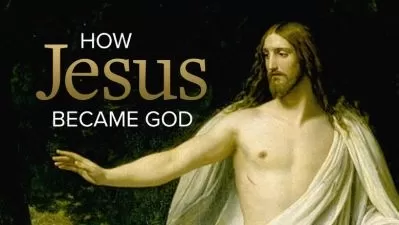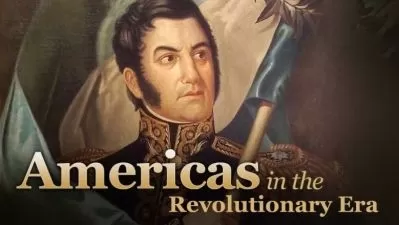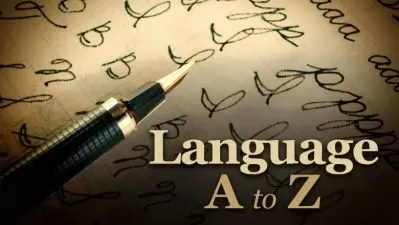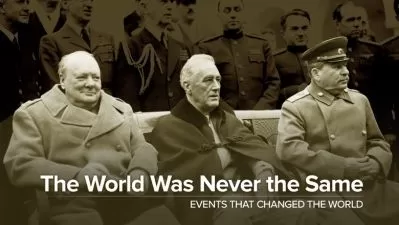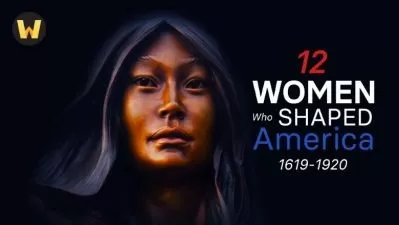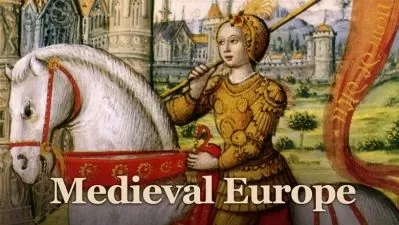Italians Before Italy: Conflict and Competition in the Mediterranean
Kenneth R. Bartlett
12:09:24
Description
In 1260, the Italian city-states of Florence and Siena went to war. With wealth and power on its side, there was no question the Florentine force could easily overpower the underdog city-state of Siena. But that's not what happened. Against overwhelming odds, the Sienese won the crucial Battle of Montaperti, defeating their mighty enemy and preserving their independence.
That was nearly eight centuries ago, and yet, still today, whenever the team from Siena meets the Florentines on the soccer field, devoted Sienese fans chant "Montaperti! Montaperti!" in honor of that historic victory.
Throughout the Italian peninsula, you'll find the same thing: time-honored traditions, and ancient grudges. It seems there is not one Italy, but many—a mosaic of histories and culture that make up this dynamic nation.
Why do Italians remain so faithful to age-old rivalries and hometown traditions 150 years after the country's unification? What traces of this remarkable heritage do we see surviving in today's Italy?
In The Italians before Italy: Conflict and Competition in the Mediterranean, you'll find the answers to these and other fascinating questions. Esteemed Italian history professor Kenneth R. Bartlett takes you on a riveting tour of the peninsula, from the glittering canals of Venice to the lavish papal apartments and ancient ruins of Rome.
This course traces the development of the Italian city-states of the Middle Ages and the Renaissance, showing how the modern nation of Italy was forged out of the rivalries, allegiances, and traditions of a vibrant and diverse people.
A More Complete Picture of Italian History
Professor Bartlett offers something unique with this course: a more comprehensive portrait of Italian history than you'll find nearly anywhere else. Those with no previous experience with Italian history and culture will find an exciting new world opening to them, and those who have visited Italy will be eager to return.
Through memorable stories and intriguing insights, Professor Bartlett shows how the particular circumstances of each independent state helped forge a distinct cultural character. Here's a sample of the many fascinating facts you'll learn:
- Venice was so invested in its local glassmaking industry that its city fathers would send assassins after Venetian citizens who tried to leave the city-state and practice their craft elsewhere.
- Merchants from Pisa used earth from Jerusalem as ballast on return voyages from the Crusades. They spread the soil in the city cemetery to ensure that Pisan citizens would be first in line to enter heaven on Judgment Day.
- Birthplace to Virgil, the poet of ancient Rome, Mantua was home to the first opera, Monteverdi's Orfeo, as well as the amazing Mannerist palace, the Palazzo Te.
Intriguing stories like these create a rich, diverse portrait of Italy—a grand mosaic of lustrous and storied cultures as distinctive as the people who helped build them.
"Better a Death in the House than a Pisan at the Door"
As you come to know these many Italys, you'll see how the Italian states defined themselves against the others, competing for territory, trade, and artistic supremacy—and how the vestiges of these interactions are visible even today.
Consider the rivalry between the Genoese and the Pisans. Why do the Genoese of today prefer "a death in the house to a Pisan at the door," as the old adage says? It all stems from an ancient grudge, going back nearly eight centuries. In 1241, ongoing tensions boiled over into full-scale warfare as Pisa went to battle with Genoa. The Pisans won handily, destroying the Genoese fleet in the process. The sting of that defeat—and the resulting hatred of all Pisans—lives in the hearts and memories of many modern-day Genoese.
Throughout the course you'll see how rivalries like this one have played out, fuelling the artistic, political, and cultural innovations—from technology to fashion design—for which Italy is famous today.
Italy on the World Stage
But the stories of the Italian states are also inextricably linked with large world events of the late Middle Ages and Renaissance.
Your first stop is the Near East, where you'll examine how the Crusades influenced the development of Genoa, Pisa, and Venice. Professor Bartlett explains how these burgeoning maritime states came to dominate seafaring trade by providing passage to knights and their retainers and importing luxury goods from the East.
Looking to the West, you'll explore Italy's troubled relationship with the Holy Roman Empire and the Catholic Church. Professor Bartlett traces the ever-shifting role of the papacy and the emperor in Italian life and politics, including the famous struggle among three competing popes who simultaneously battled to rule the Western church.
And then there are the competing international powers that threatened Italian independence, such as the repeated incursions by the Turkish Empire. You'll see how the Italian city-states struggled to overcome their differences to face this powerful foe, and how time and again, regional competition within the Italian peninsula nearly destroyed their ability to keep outside threats at bay.
Tales of Intrigue and Inspiration
Throughout this course, you'll also get a glimpse into the lives of the powerful and influential, and see how far they were willing to go to reap the profits of power. You'll hear about:
- Pope Paul IV, who championed the Roman inquisition and, in his zeal to root out heresy, was said to have hidden in the room of a dying priest so he could hear his last confession.
- Luigi Gonzaga, who cut out the hearts of his enemies and nailed them to the doors of their palaces as a warning to others who might challenge his power.
- Ugolino, the so-called Cannibal Count of Pisa, who was imprisoned with his sons and grandsons until they died of starvation, and is rumored to have feasted on his children's bodies to maintain his strength.
But the story of Italy's fabled past is also one of inspiration. You'll hear of great leaders—the Medicis, Borgias, and Estes—who wielded the tools of statecraft and fostered one of the greatest periods of cultural activity the world has ever known.
Italian Identity—Then and Now
As you get to know the distinctive personalities and events that define the peninsula, you'll gain fresh insights into the Italy of today.
You'll learn how the ancient guilds that dominated life and trade in medieval Italy helped forge the modern Italian sense of pride of place. From the revered guilds of the great shipbuilders of 14th-century Venice to the modern workshops of Prada and Ferragamo, there is a direct line of ancestry, one that speaks of a remarkable heritage of craftsmanship.
This course also sheds light on the tumultuous politics of today's Italy. As you examine the political highs and lows of Italy's great city-states, you'll gain a new understanding of civic life in Italy—a nation infamously difficult to rule.
Join Professor Bartlett for this illuminating view of the rich mosaic that is the Italian peninsula. Surprising, enriching, always engaging, The Italians before Italy offers a unique and comprehensive perspective on one of the most dynamic and creative cultures of the modern world.
More details
User Reviews
Rating
Kenneth R. Bartlett
Instructor's CoursesProfessor Kenneth R. Bartlett is a Professor of History at the University of Toronto. He received his Ph.D. from the Centre for Medieval Studies at the University of Toronto in 1978. He was the first director of the University of Toronto Art Centre and founding director of the Office of Teaching Advancement at the university, a position he held until 2009.
Much of Professor Bartlett’s career has been devoted to bringing the culture of European history into undergraduate and graduate classrooms. He has taught regularly in the University of Toronto Summer Abroad programs in Europe. He has been the recipient of numerous teaching awards, most notably, the 3M National Teaching Fellowship, awarded by the Canadian Society for Teaching and Learning in Higher Education, and the inaugural President’s Teaching Award from the University of Toronto. In 2007, Professor Bartlett was one of the 10 finalists in TVOntario’s Best Lecturer Competition, which pits students’ favorite instructors against one another in a battle of charisma, clarity, passion, and conviction. That same year, the professor was recognized with an inaugural Leadership in Faculty Teaching Award by the government of Ontario.
Professor Bartlett is the author of The English in Italy, 1525–1558: A Study in Culture and Politics; The Civilization of the Italian Renaissance: A Sourcebook; and most recently, A Short History of the Italian Renaissance. He is also coeditor or translator of five other books, including Humanism and the Northern Renaissance (with M. McGlynn), and author of more than 35 articles and chapters on European history and culture. He has been the academic consultant and occasional on-camera commentator for the Illuminated Filmworks videos about the Vatican Library and for such television series as The Naked Archaeologist and Museum Secrets.
Together with his wife, Gillian, who herself holds a Ph.D. and is the author of seven books, Professor Bartlett regularly leads tours to Europe for major museums, universities, and cultural organizations.
Professor Bartlett’s other Great Courses include The Development of European Civilization, The Italian Renaissance, and The Italians before Italy: Conflict and Competition in the Mediterranean.

The Great Courses
View courses The Great Courses- language english
- Training sessions 25
- duration 12:09:24
- English subtitles has
- Release Date 2023/06/06






